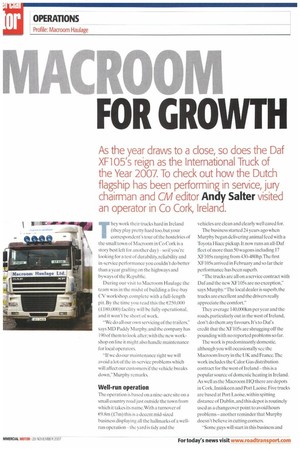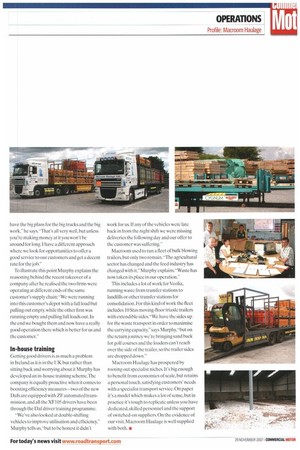fillitC 0 NI
Page 62

Page 63

If you've noticed an error in this article please click here to report it so we can fix it.
FOR GROWTH
As the year draws to a close, so does the Daf XF105's reign as the International Truck of the Year 2007. To check out how the Dutch flagship has been performing in service, jury
chairman and CM editor Andy Salter visited
an operator in Co Cork, Ireland.
They work their trucks hard in Ireland (they play pretty hard too, but your correspondent's tour of the hostelries of the small town of Macroom in Co Cork is a story best left for another day) — so if you're looking fora test of d urability, reliability and in-service performance you couldn't do better than a year grafting on the highways and byways of the Republic.
During our visit to Macroom Haulage the team was in the midst of building a five-bay CV workshop, complete with a full-length pit. By the time you read this the €250,000 (i.180,000) facility will be fully operational, and it won't be short of work.
"We do all our own servicing of the trailers," says MD Paddy Murphy, and the company has 190 of them to look after; with the new workshop on line it might also handle maintenance for local operators.
"If we do our maintenance right we will avoid a lot of the in-service problems which will affect our customers if the vehicle breaks down," Murphy remarks.
Well-run operation The operation is based on a nine-acre site on a small country road just outside the town from which it takes its name.With a turnover of €.9.8m (17m) this is a decent mid-sized business displaying all the hallmarks of a wellrun operation — the yard is tidy and the vehicles are clean and clearly well cared for.
The business started 24 years ago when Murphy began delivering animal feed with a Toyota Hiace pickup. It now runs an all-Daf fleet of more than 50 wagons including 17 XF105s ranging from 430-480hp.The first XF105s arrived in February and so far their performance has been superb.
"The trucks are all on a service contract with Daf and the new XF105s are no exception," says Murphy. "The local dealer is superb, the trucks are excellent and the drivers really appreciate the comfort."
They average 140,000km per year and the roads, particularly out in the west of Ireland, don't do them any favours. It's to Dais credit that the XF105s are shrugging off the pounding with no reported problems so far.
The work is predominantly domestic, although you will occasionally see the Macro= livery in the UK and France. The work includes the Calor Gas distribution contract for the west of Ireland— this is a popular source of domestic heating in Ireland. As well as the Macroorn HQ there are depots in Cork, Inniskeen and Port Laoise. Five trucks are based at Port Laoise, within spitting distance of Dublin, and this depot is routinely used as a changeover point to avoid hours problems— another reminder that Murphy doesn't believe in cutting corners.
Some guys will start in this business and have the big plans for the big trucks and the big work," he says. "That's all very well, hut unless you're making money at it you won't he around for long. I have a different approach where we look for opportunities to offer a good service to our customers and get a decent rate for the job."
To illustrate this point Murphy explains the reasoning behind the recent takeover of a company after he realised the two firms were operating at different ends of the same customer's supply chain:"We were running into this customer's depot with a full load but pulling out empty, while the other firm was running empty and pulling full loads out. In the end we bought them and now have a really good operation there which is better for us and the customer."
In-house training Getting good drivers is as much a problem in Ireland as it is in the UK but rather than sitting back and worrying about it Murphy has developed an in-house training scheme.The company is equally proactive when it comes to boosting efficiency measures — two of the new Dais are equipped with ZF automated transmission, and all the XF105 drivers have been through the Dat driver training programme.
"We've also looked at double-shifting vehicles to improve utilisation and efficiency," Murphy tells us,"but to be honest it didn't work for us. If any of the vehicles were late back in from the night shift we were missing deliveries the following day and our offer to the customer was suffering."
Macroom used to run a fleet of bulk blowing trailers, but only two remain."The agricultural sector has changed and the feed industry has changed with it," Murphy explains."Waste has now taken its place in our operation."
This includes a lot of work for Veolia, running waste from transfer stations to landfills or other transfer stations for consolidation. For this kind of work the fleet includes 10 Stas moving-floor triaxle trailers with extendible sides. "We have the sides up for the waste transport in order to maximise the carrying capacity," says Murphy, "but on the return journey we're bringing sand back for golf courses and the loaders can't reach over the side of the trailer, so the trailer sides are dropped down."
Macroom Haulage has prospered by rooting out specialist niches. It's big enough to benefit from economies of scale, but retains a personal touch, satisfying customers' needs with a specialist transport service. On paper it's a model which makes a lot of sense, but in practice it's tough to replicate unless you have dedicated, skilled personnel and the support of switched-on suppliers. On the evidence of our visit, Macroom Haulage is well supplied with both.•






















































































































































































